

 |
 |
||||
| Home | Reviews | Extras | Forums |
|
Muv-Luv Alternative: Total EclipseSynopsisHumanity came in contact with marauding aliens, nicknamed the "BETA", in 1967, and since then the United Nations has been engaged in a near-constant war with these invaders, who appear to be mindless and driven by nothing besides aggression and carnivorous instincts. By 1998, the aliens have rendered large portions of Eurasia uninhabitable; at that time, Yui Takamura is a student at the Kyoto Royal Guard Academy, where she and her friends are training to become Tactical Surface Fighter (TSF) mecha pilots for the Imperial Guard. That same year, however, the Korean peninsula is invaded by BETA, who proceed to attack Japan and overrun Kyoto, killing most of Yui's family and friends in the process and forcing the Japanese army to use scorched-earth tactics and destroy much of their country to contain the BETA. Three years later, Yui is a lieutenant in the Japanese Imperial Guard stationed at at UN base in Alaska, on the relatively safe North American continent, where she oversees a project that is testing and experimenting on new TSF technology. She soon comes into conflict with one of the new test pilots, Yuuya Bridges, a Japanese-American pilot who infuriates her via his nonchalant attitude, compared to the devotion to the project felt by those whose countries have been destroyed by the BETA, and via his disdain for Japan, which stems from racism he experienced as a child. ReviewMuv-Luv Alternative: Total Eclipse was the sort of show that I expected to be completely dreadful: after all, it's a spinoff of (what sounds to me like) a generic dating sim that employs the overused "marauding bugs from space" plot, with an ugly color scheme and what looked like a lot of cheap fanservice to boot. There are ultimately just two reasons why I'm even sitting here writing this review, the first being that I'd come across the catchy, echo-laden electropop opening theme (courtesy of Kumi Koda), which was enough to give me a vague interest in watching a few episodes just for the hell of it, and the second being that I was in need of something that was action-heavy, simple, and digestible to watch while exercising. And so, watch Total Eclipse while exercising I did, and I'll be damned if in spite of the problems I mentioned before and several frustrating plot holes, it isn't actually a bad show. It expended some of my initial goodwill later on with some ill-advised plot twists and a horridly unsatisfying cliffhanger ending, but there's enough fun and some surprisingly compelling drama during the first half to make it at least somewhat worth the time. Though Total Eclipse is, overall, a mecha-centered science fiction series, it tries its hand at a few secondary genres along the way. It misleadingly comes across as a rather light-hearted school-centered show with mecha elements at the very start, before quickly turning into a more serious but still not entirely dark action series (perhaps comparable to RahXephon in tone) and then launching into what is unequivocally horror, all within the space of two episodes; while it settles on being a relatively serious action-oriented series after that, I know people for whom the sheer degree of genre-shifting at the start has been a major negative. But I did actually find these episodes compelling, since Yui's shift from being an enthusiastic cadet fighting alongside her friends to watching them be torn to pieces and eaten alive while seeing her hometown (which if I'm correct is considered to be one of Japan's most beautiful city) burn and barely escaping being devoured herself explains the withdrawn, touchy, and almost too-patriotic personality she exhibits during the show's main portion. It's a big boon to the show for the viewer to have the context for this without having to wait for flashbacks to "prove" that she's not just some awful person: Total Eclipse wants to say, "yes, she's complex and there are reasons for her being this unpleasant" from the start, which I appreciated. And indeed, I would be surprised if anybody survived such an experience without having their personality warped, somehow, for these scenes are graphic, harrowing, and utterly horrifying. Total Eclipse isn't a great-looking series overall, for the color scheme consists of awkwardly clashing murky tones on the characters and background art and Day-Glo colors on the mecha, and the character design is ho-hum dating sim material, but there is a single spot in which the series excels, and that is the scenes of the BETA. These aliens are terrifying creations, rendered into wrinkly, corpse-like textures via CGI and given only the vaguest resemblance to anything alive on earth, their eyeless heads and rows of teeth only slightly less horrifying than the sight of these heads and teeth tearing and killing. This show rivals Attack on Titan in the skill of making the adversaries appear intrinsically unsettling, and it gives the action scenes much-needed tension. 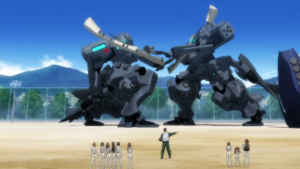 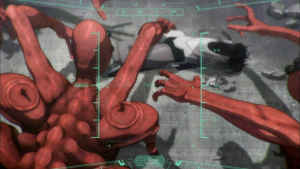 And as with the Titans in that show, we don't ever really get a great sense of what the BETA are or if they are indeed anything besides a marauding race of alien parasites; there's a very tangentially-addressed point about two characters possibly having been genetically engineered to be able to communicate with them, but given how late in the series we learn about this, it's a bit of a red herring. Indeed, later in its run, Total Eclipse seems to try its darned hardest to make it clear that it's really the humans who are their own worst enemy, rather than the BETA necessarily, by first throwing in a strange subplot about the Soviet Union (which still exists in this universe) meddling with UN military operations for its own self-interest, and by then introducing a terrorist organization called the "Refugee Liberation Front" that attempts to enact revenge on the UN forces for neglecting those displaced by the invasion. Hypothetically, the second of these plots could be interesting given that Total Eclipse actually does a halfway decent job with its geopolitics during its first half (and I'll get to that in a minute), but since there's nothing that the RLF is obviously accomplishing on the behalf of the refugees by attacking the Yukon base, it simply seems that they're blowing things up for the hell of it, making them more cartoonishly stupid than anything. And as for the Soviet Union, if Indiana Jones and the Kingdom of the Crystal Skull accomplished nothing else it proved that using the Soviet Union as your whipping boy has long become a stale cinematic plot device. Total Eclipse badly wants to emulate Evangelion by slowly revealing to the audience that the world is as threatened by politics as it is by alien monsters, but it doesn't come up with a convincing script for this, and this portion of the show ultimately amounts to cheap gunfights. It doesn't help that there's just about no closure; it's doubling damning because the show is 24 episodes long, which one would hope would give it enough time to write a passable ending, but a surprising chunk of it is wasted on comic relief. 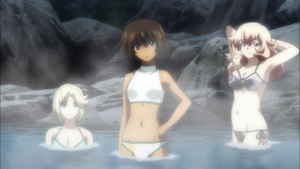 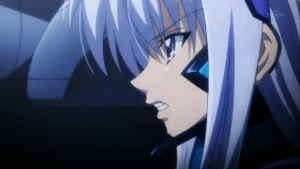 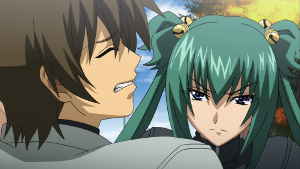 What does make this show remotely worth watching is its main cast and the degree of care the writing takes with their backstories, particularly with the geopolitics involved. As mentioned before, it's very easy to see how Yui's personality was shaped by Japan's fate in the war, and Total Eclipse missed an opportunity with the RLF because it otherwise does a rather good job of looking at conflicts between those from countries ravaged by the war and those from places that were relatively unaffected. Frustratingly, Japan escapes any and all criticism, but in some other regards the show is salient: at one point, a group of cadets from outlying Soviet territories confronts two of the main characters, two specially-trained Russian TLF test pilots named Cryska and Inia, and take out their anger at their families and towns having been abandoned by the troops from Russia proper during the invasion. Indeed, just as in real life the Soviet territories were not at all on equal footing with Russia itself, Cryska's tone-deaf pleas that "we're all Soviets!" simply don't ring true with the Ukrainians and Kazakhs who see her and her country as naive and privileged. I will say that it's a difficult scene to watch because of how close some of the male cadets in the group come to sexually assaulting Cryska, and because this point is, unfortunately, never brought up again even when some of said cadets are shown in a more positive light. While it never quite gets as bad as that again, one of the worst aspects of Total Eclipse is the fanservice, which, while nowhere near as heavy as that in shows like Infinite Stratos, tends to be creepy and voyeuristic, with the sheer amount of bouncing (and anatomically unrealistic) breasts during the opening sequence probably being the best indicator. Regardless, though, Cryska and Inia, are interesting because of how naive they are on the state of the world and the state of those who've been most affected by the BETA, in spite of being entrusted to stop the BETA. Similarly, Yuuya fits a bit too neatly into the realm of being an uptight, self-hating angst-maelstrom, but his backstory and the reasons for his clashing so much with Yui's personality make sense: he has the luxury of being from the United States, which in this universe has basically escaped any sort of direct combat, and just as I sometimes think that my fellow Americans need to think more about how we've freely engaged in conflict with their being little-to-no chance of the fight ever reaching our shores, Yuuya makes a large number of comments that show that he's severely sheltered on that front. At the same time, he's half-Japanese but from an isolated, mostly-white town in the south, and he's lived with xenophobia and accusations of him "not really being American" all of his life, made worse when his Japanese father abandoned his mother; this is, again, a salient critique of the U.S., even if it employs the common and misleading device of using the South (and the South alone) as being synonymous with racism. He thus has no real love for Japan, and he and Yui butt heads at nearly every second, at least until the show does a surprisingly good job of having them work their differences out when they're stranded together on an island (as part of a fanservice episode, of all things) and manage to explain the roots of their worldviews to each other, finally, instead of simply being defensive. Several of the side characters, volunteer fighters from places like Nepal and Sweden that have also been ravaged, don't get a huge amount of character development beyond being shown as, like, Yui, far more committed to the cause than Yuuya, but they brighten up the show a fair bit: the aforementioned Nepali, Tarisa Manandal, who's a slightly hotheaded but fundamentally goodhearted genki character goes on my list as one of anime's better-written South Asian characters. 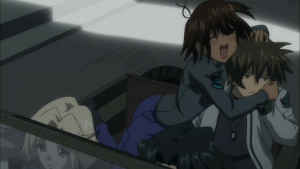 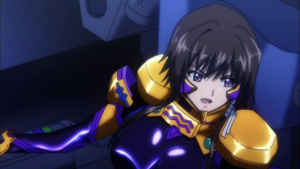 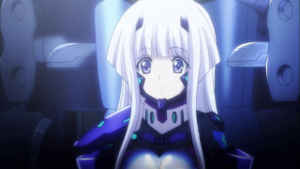 Ultimately, it's possible that I'm defending Total Eclipse more than it's worth, and that I'm giving it too much of the benefit of the doubt simply because it outdid my (extremely low) expectations. Yes, it works fairly well as mecha action, but it's also ugly, loaded with unfunny comic relief, and sometimes given to creepy fanservice, while its ending leaves much to be desired. But it's watchable once these caveats are kept in mind, and it's often enjoyable simply because its characters, while beholden to anime archetypes, are good enough to save the show from its problems: the details of their backstories are well-written enough to spare this show from simply being another poorly-written alien invasion story, and the appeal of their personalities themselves makes some otherwise unwatchable shenanigans tolerable. I wouldn't go into this expecting a great mecha series, but it's none too shabby for a dating sim spinoff. A bit of a weak three stars, since it has many, many problems with plotting and pacing, but the characters and the greater-than-expected care taken with their backstories help the show quite a bit. Stay away if you don't like mecha or if you can't handle gore. — Nicoletta Christina Browne Recommended Audience: Teenagers and up, and definitely not for the squeamish. Characters are fairly graphically eaten alive during the second episode, and there are a few later scenes that are almost (though not quite) as horrifying as this. Gore and violence aside, there's a fair bit of fan service, and there's also the one scene in which some cadets come very close to raping Cryska. All that is to say, this is definitely not something that children should watch. Version(s) Viewed: Digital stream on Crunchyroll, Japanese with English subs. Review Status: Full (25/25) Muv-Luv Alternative: Total Eclipse © 2012 Koki Yoshimune-ixtl/TV TOKYO/ALTERNATIVE 1st Project |
 |
|
| © 1996-2015 THEM Anime Reviews. All rights reserved. |